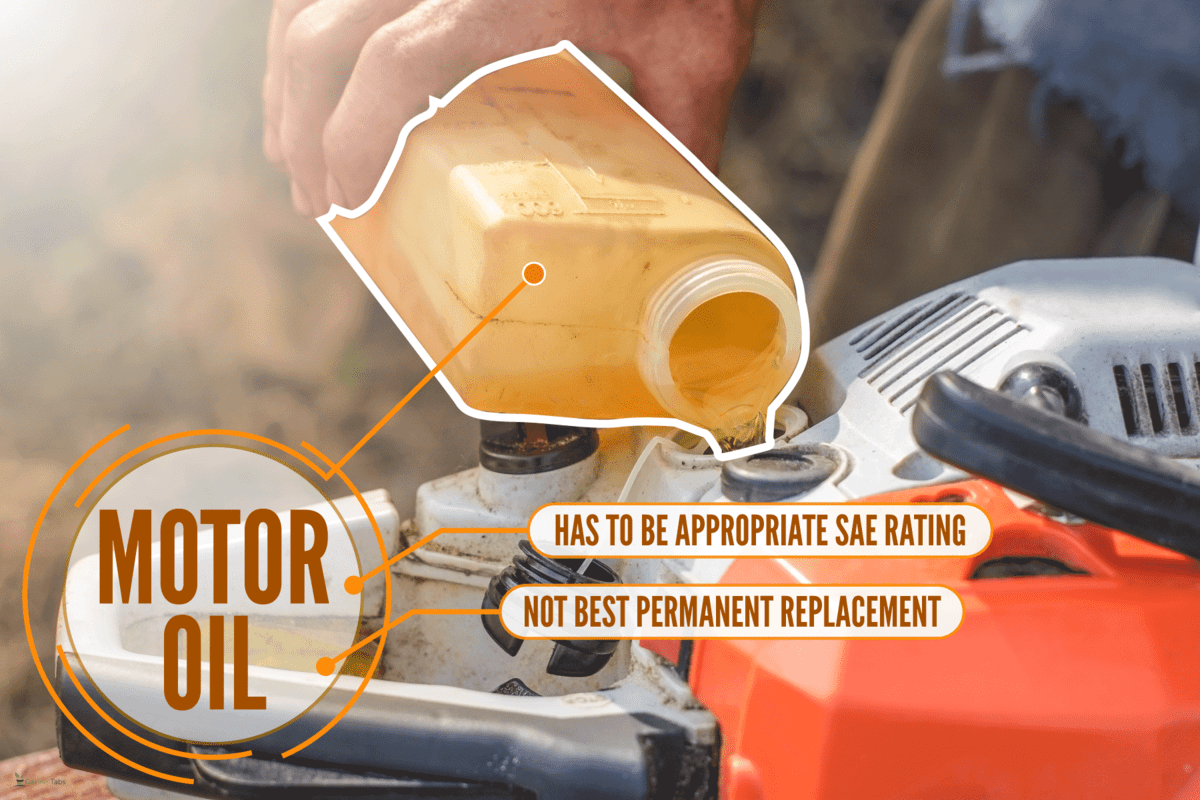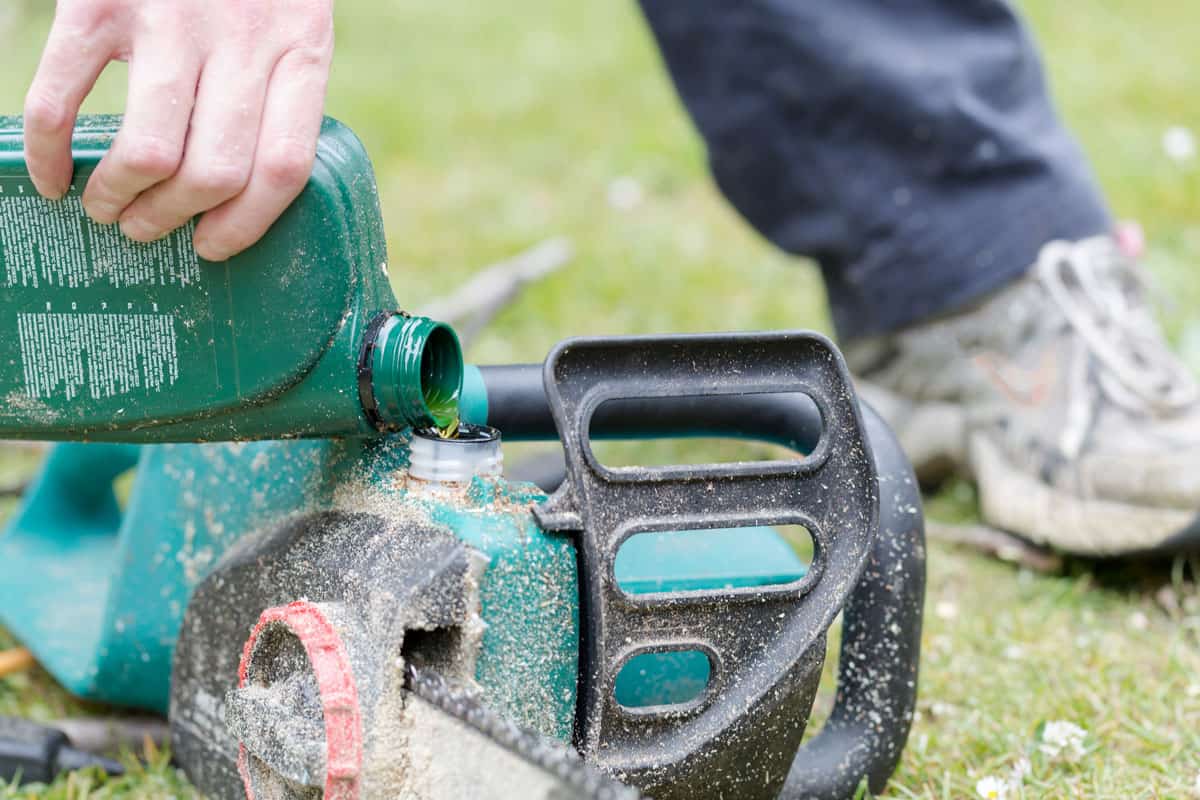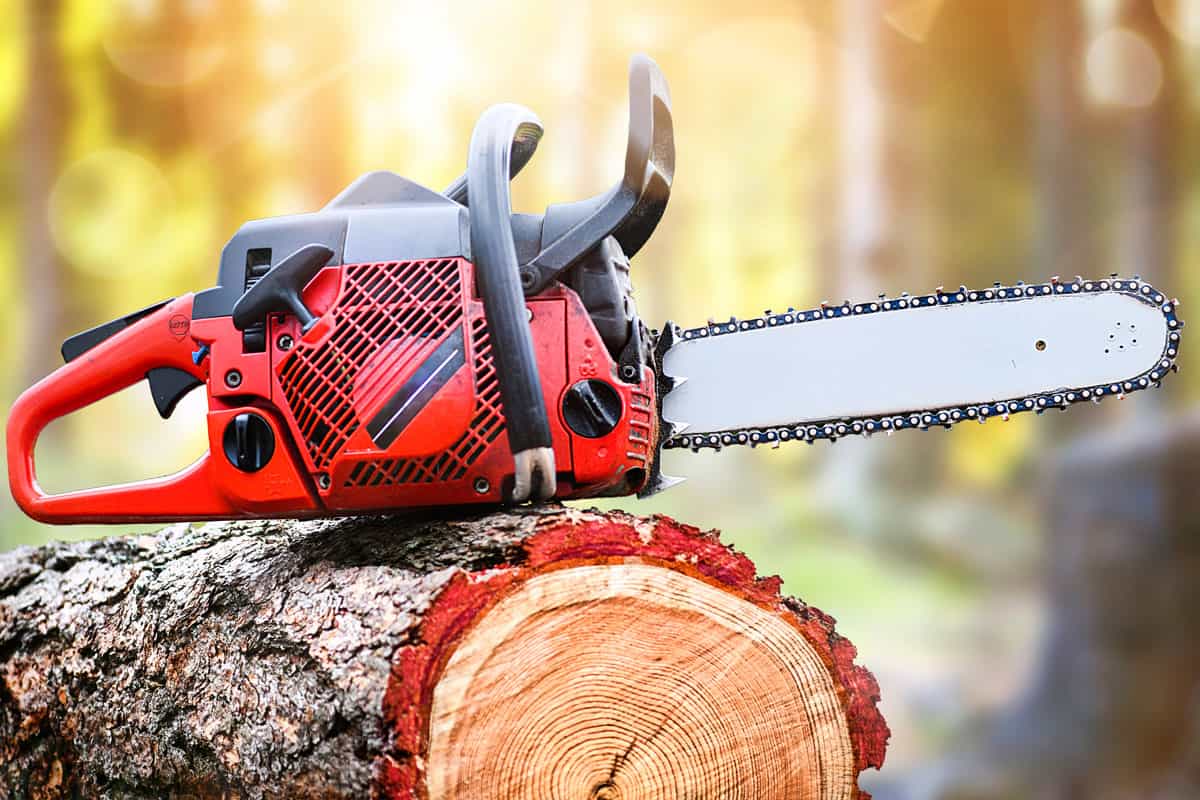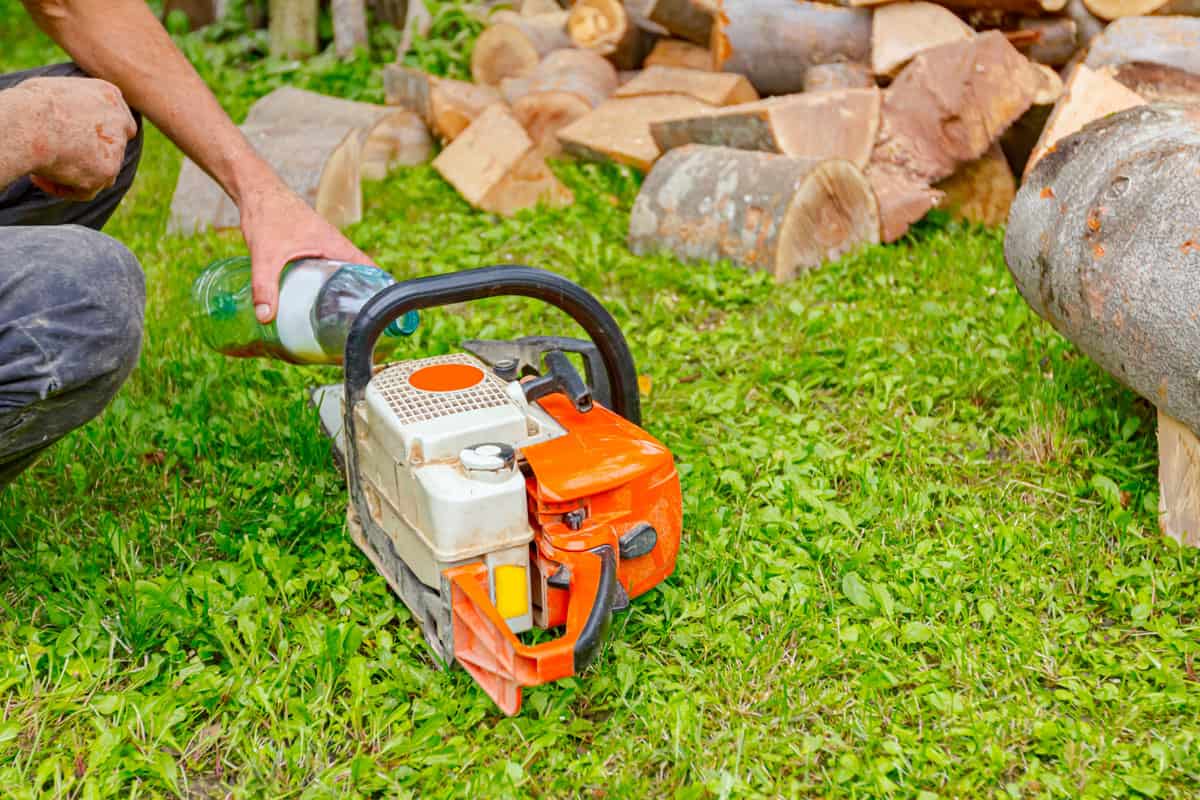Chainsaws are designed to operate with specialized lubricants specifically created for their components and operation. But in the absence of chainsaw oil, can you use motor oil? We've done our research, and here's the answer we found.
You can temporarily use motor oil in a chainsaw to keep it running. However, it should have the appropriate SAE rating to ensure it has the right viscosity level. Note that motor oil might not be the best permanent replacement for chainsaw oil.
A chainsaw is useful for a wide range of jobs, from pruning to tree felling, bucking, and limping. Keep reading to learn about the right oil to use for your chainsaw and the alternatives you can replace it with.


 Can You Use Motor Oil in a Chainsaw?
Can You Use Motor Oil in a Chainsaw?
Yes, you can use motor oil as a chainsaw oil alternative, but it is not without its drawbacks. Motor oil is thicker than the oil used for chainsaws and can cause a significant buildup of residue on internal engine parts.

This buildup can lead to reduced performance from the chainsaw and an increased risk of malfunction or injury. Using motor oil could also void the warranty on your chainsaw.
In addition, motor oil is not biodegradable. It can contaminate the air and soil and damage plants and trees. This is why you must be careful about using motor oil on your chainsaw when working with live trees.
For optimal performance, using the right lubricant type when operating a chainsaw is important. The manufacturer's instructions should outline what kind of lubricant should be used in the engine and chain bar, so it is best to follow these guidelines closely.
What Oil is Best For Chainsaw?

The best oil will not only keep your chainsaw running smoothly but will also help you avoid clogging and extend the life of your chainsaw. The best oil for your chainsaw is one made for a four-stroke engine. It will also need additives, especially a fuel stabilizer, to prevent carbon buildup.
It should have anti-wear corrosion and oxidation inhibitors to slow the oxidation process and keep the chain and bar lubricated. For chainsaws with a two-stroke engine, the best oil for your chainsaw is a semi-synthetic oil.
This is because it has excellent lubricating properties, even in harsh weather conditions.
Also, the chainsaw oil is designed to be a more durable lubricant for your chainsaw. It is made of a petroleum or vegetable base. It is more adhesive than regular motor oil. It can also be mixed to your preference.
It's important to fill your oil reservoir with bar and chainsaw oil every time you fill-up the gas tank. If you don't, your chainsaw will not be lubricated and will start to burn out.
Chainsaw oil has some properties that protect your chain from rust, while motor oil does not. Here are some of the best oils for chainsaws.
Oregon Chainsaw Bar and Chain Oil
Oregon Chainsaw Bar and Chain oil is an uncolored oil that provides superior lubrication for saw chains and guide bars. It has been formulated to reduce friction, minimize wear, eliminate resin buildup and ensure maximum performance of your saw.
Made with a special blend of refined base oils, it helps protect against rust and corrosion from moisture or water contact. The exclusive additive package will increase the life of your bar and chain while helping to prevent gumming and plugging in extreme temperatures.
Check out the Oregon bar and chain oil on Amazon
STP Premium Oil
STP Premium Oil is designed to keep your chainsaw running smoothly and efficiently. It contains special additives that help protect against engine deposits, gum build-up, varnish, sludge, and heat damage from extreme temperatures.
It is formulated with zinc dialkyl dithiophosphate, which gives it maximum anti-wear-and-tear properties.
Check out the STP Premium oil on Amazon
How Do I Know If My Chainsaw Needs Lubricant?

Proper lubrication is the key if you want to maintain the performance and longevity of your chainsaw. When you do not lubricate your chainsaw, you could likely experience a loss in power and might even cause your chainsaw to smoke.
To know if your chainsaw needs lubricant, check the oil reservoir on it to ensure it is full. The oil reservoir should be filled with the funnel that comes with your chainsaw.
Note that too much oil can collect debris, which can affect chainsaw performance. So, the right oil quantity in the chainsaw is the level at which the funnel is filled up. Make sure you check for leaks in your oil reservoir before you fill it up.
Another way to know if your chainsaw needs lubricant is when there's overheating or friction. The chain and bar of your chainsaw are in constant contact with one another.
Lubricants will help to prevent friction and overheating. The general rule of thumb is to oil your chain and bar at least every time you use your chainsaw.
What Happens If I Use a Chainsaw Without Oil?
Using a chainsaw without oil can cause serious damage to your chainsaw. The more friction there is between the bar and the chain, the more heat is produced, and the more the chain and blades will wear out. The result of this is overheating, and more fuel is consumed.
Also, this heat can cause other problems, like melting plastic components around the chain sprocket. It can also cause the saw to smoke, which could cause damage to the chain tips.
Steps to Properly Lubricate a Chainsaw With Chainsaw Oil

Each chainsaw has its specification and mixing requirements. However, the general rule of thumb is to use a 50:1 ratio for mixing chainsaw oil. Check your product manual to see the specified mixing ratio for your chainsaw.
Avoid using cheap oil and gas to avoid complications on your chainsaw. This section contains a step-by-step guide on how to oil your chainsaw with chainsaw oil.
For safety, make sure you wear the proper equipment when working with your chainsaw. The protective safety equipment includes a hard hat, hearing protection, and safety glasses. Wearing non-slip shoes while working with a chainsaw is also a good idea.
1. Prepare The Chainsaw
The first stage is to place the chainsaw on level ground. You can use a flat table as an alternative to this. Then, proceed to remove the battery if it's a battery-powered chainsaw.
This prevents the chainsaw from accidentally starting on its own while lubricating it. For gas-powered chainsaws, ensure the engine is cooled down before lubricating it.
2. Locate The Oil Reservoir
Most chainsaws come with a separate oil reservoir. Ensure that you do not mistake the oil pump for the oil reservoir. The reservoir cap is next to the handle, and all you have to do is to remove the reservoir cap to locate the oil reservoir.
3. Add The Chainsaw Oil and Run It
Insert a funnel into the oil reservoir and add the chainsaw oil into it. Ensure that the oil reservoir is filled up, but ensure that it is not overfilled.
Return the reservoir cap and run the chainsaw for 5 minutes for the oil pump to distribute the chainsaw oil to the bar and chain.
If you have an electric chainsaw, you must make sure that the chain is completely dry before you start working. You should always turn the chainsaw off in case of rain or snow. Chainsaws can overheat if they get flooded with water. They can also get damaged by lightning.

What Other Alternatives Can I Use Instead of a Chainsaw Oil?
There are several alternatives you can use instead of chainsaw oil. They include the following:
Vegetable Oil

Vegetable oil is a good alternative to chainsaw oil. It is environmentally friendly and cheap. It is also a sticky, fairly viscous oil with a high flash point. However, it is not the best choice for long-term use because it clumps at lower temperatures.
Canola Oil

Another good alternative is canola oil. It is one of the thinnest oils, which makes it easier to wash off. It is also similar to vegetable oil, except it performs well at low temperatures.
It can also keep your chainsaw safe, with little to no fumes. However, it dries out faster than other oils. This means you will have to fill up your oil reservoir more frequently.
Soybean Oil

Soybean oil is another good substitute. It is not toxic and will prolong the shelf life of your chainsaw. It is also a good option for environmentally-conscious loggers because it is safe for humans and the environment.
Conclusion
Sometimes, using motor oil as a chainsaw oil substitute can damage your chainsaw. Motor oil should be your emergency resort for lubricating your chainsaw, not your go-to lubricating option. Also, make sure you use fresh motor oil because an already-used one can contain debris that would clog your chainsaw.
If you enjoyed reading this post, check out other related articles on chainsaws:


